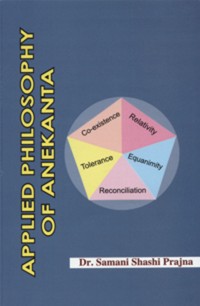Now, if there is any permanent Reality, there must be causal efficiency in it. If an entity is as absolutely permanent or absolutely non-permanent, then this characteristic does not really occur because according to the Vaiśeṣika view, that whose destruction never takes place, which is not produced and which always remains in the same form, is permanent. If this is the nature of Reality, then the question arises, the casual efficiency takes place in this permanent entity in succession or all at once, i.e., simultaneously. The reply to this is, there cannot occur causal efficiency in a permanent entity, because it is capable enough. For this reason, it cannot perform a function, which is going to take place in the second moment, and which is capable, does not make delay in performing a function, otherwise it cannot be called capable. If someone doubts that even being capable, an entity performs a function only on the association of its subsidiaries, then the incapability of a permanent entity is proved by this fact, because it is dependent on the assistance of others. The logical principle of the Nyāya is this, "that which depends on others is incapable".[1]
So a permanent entity does not perform a function even simultaneously, for it is not found in experience that an entity performs at a time a function which is going to be performed in the entire life time, or if a permanent entity performs it even simultaneously, then what will it do at the second moment? If it is said that, it performs a function at the second moment also, then the defect, which comes in the case of performance of a function in succession will also come in this case. If it is argued that a permanent entity does not do anything at the second moment, then because of the absence of causal efficiency, a permanent entity will appear as a non-entity. Thus, there does not take place causal efficiency (arthakriyākāritva) in an absolutely permanent entity in succession and simultaneously (kramākrama).On the destruction of causal efficiency in reality, the existence of it, does not remain.[2] Like an absolutely permanent reality, it is not rational to regard reality as absolutely momentary, because a momentary nature is destructible at every moment. For this reason, it cannot perform a function either successively or simultaneously.
Therefore, it can be concluded that logical expression of arthakriyākāritva (causal efficiency) as the criterion of Reality is only possible in the case of a Reality, having a nature of permanent-cum-change as conceived in Jain Philosophy. That is to say, this criterion is only applicable to the concept of sat (reality) of Jain metaphysics. This anekantic nature of Reality can perform any function either successively or simultaneously because of the causal efficiency being engrossed with in the very nature of an entity.[3] The reality according to the Jain philosopher is a variable constant. It is being and non-being (becoming included), unity and plurality, (one and many) eternal and non-eternal, universal and the particular, rolled into one, as defined by Amrit Chandra in his Ātmakhyāti. If causal efficiency is the logical criterion of Reality, the real cannot be an absolute constant, nor can it be an absolute variable. It must be a variable constant. So tīrthankara Mahāvīra established the logical criterion of permanence-cum-change nature of Reality.
 Dr. Samani Shashi Pragya
Dr. Samani Shashi Pragya

